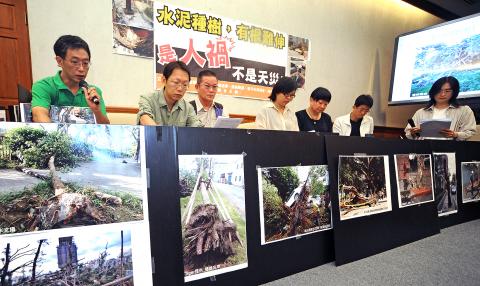The thousands of trees that fell over or were uprooted in Greater Taipei when Typhoon Soulik struck earlier this month were mainly a result of poor management rather than the natural disaster, environmental protection groups and a legislator said yesterday.
The groups showed photographs of trees on sidewalks growing out of small holes in the cement just a little wider than their trunks, as well as photographs of toppled trees with their roots still covered in plastic wrapping or in pots, taken after Typhoon Soulik swept through the Greater Taipei area.
Democratic Progressive Party Legislator Lin Shu-fen (林淑芬) said nearly 5,000 trees were seriously damaged in Taipei and New Taipei City (新北市) when the typhoon struck, but this should be blamed on the government for not caring about letting trees grow healthily.

Photo: Liu Hsin-de, Taipei Times
Lin, who recently visited Singapore to investigate its policies and regulations on protecting street trees, said Taiwan lacks a government authority in charge of maintaining trees in urban areas, a comprehensive national policy on the management of street trees and related regulations.
“Singapore’s tree-cover rate in urban areas is about 46 percent. They have many tree doctors responsible for taking care of every street tree, who would be at fault if any tree falls down due to illness or improper care,” she said.
Showing the regulations in Japan for planting street trees, which detail the optimum soil pH levels for trees, the best grain size of the soil, planning for good drainage, as well as various other requirements, Lin Chang-mao (林長茂) of the Green Formosa Front said street trees in Taiwan are often planted sloppily by only “digging a hole to put the tree in,” which results in many “ill-growing” trees.
Showing several examples found in New Taipei City, Pan Han-chiang (潘翰疆), head of a tree protection volunteer group, said many tree pits were too small for the trees’ roots to grow and extend deep into the soil to anchor them firmly. It is then only natural that these trees were uprooted by the typhoon’s strong winds.
“It’s like the ancient Chinese custom of ‘foot binding.’ The trees are being mistreated and are in pain, but they cannot speak out,” said former People First Party (PFP) legislator Chang Show-foong (張曉風), who is also the author of a textbook article called “Street Tree.”
Tamkang University transportation management associate professor Chang Sheng-hsiung (張勝雄) said sidewalks in Taiwan have lost many of their original functions, such as offering drainage and an appropriate space for planting healthy trees, because they were paved over with large amounts of concrete.
“Street trees not only provide shade for pedestrians in hot weather, they also soften people’s hearts — causing drivers to stay calm and drive slower,” he added.
“The government should really reflect on what has been allowed to go on and think about planting appropriate tree species, how to plant them properly and how to keep them in good health,” Chang Show-foong said.
“They should not spend taxpayers’ money on meaningless practices,” he added.

Taiwan is stepping up plans to create self-sufficient supply chains for combat drones and increase foreign orders from the US to counter China’s numerical superiority, a defense official said on Saturday. Commenting on condition of anonymity, the official said the nation’s armed forces are in agreement with US Admiral Samuel Paparo’s assessment that Taiwan’s military must be prepared to turn the nation’s waters into a “hellscape” for the Chinese People’s Liberation Army (PLA). Paparo, the commander of the US Indo-Pacific Command, reiterated the concept during a Congressional hearing in Washington on Wednesday. He first coined the term in a security conference last

A magnitude 4.3 earthquake struck eastern Taiwan's Hualien County at 8:31am today, according to the Central Weather Administration (CWA). The epicenter of the temblor was located in Hualien County, about 70.3 kilometers south southwest of Hualien County Hall, at a depth of 23.2km, according to the administration. There were no immediate reports of damage resulting from the quake. The earthquake's intensity, which gauges the actual effect of a temblor, was highest in Taitung County, where it measured 3 on Taiwan's 7-tier intensity scale. The quake also measured an intensity of 2 in Hualien and Nantou counties, the CWA said.

The Overseas Community Affairs Council (OCAC) yesterday announced a fundraising campaign to support survivors of the magnitude 7.7 earthquake that struck Myanmar on March 28, with two prayer events scheduled in Taipei and Taichung later this week. “While initial rescue operations have concluded [in Myanmar], many survivors are now facing increasingly difficult living conditions,” OCAC Minister Hsu Chia-ching (徐佳青) told a news conference in Taipei. The fundraising campaign, which runs through May 31, is focused on supporting the reconstruction of damaged overseas compatriot schools, assisting students from Myanmar in Taiwan, and providing essential items, such as drinking water, food and medical supplies,

Prosecutors today declined to say who was questioned regarding alleged forgery on petitions to recall Democratic Progressive Party (DPP) legislators, after Chinese-language media earlier reported that members of the Chinese Nationalist Party (KMT) Youth League were brought in for questioning. The Ministry of Justice Investigation Bureau confirmed that two people had been questioned, but did not disclose any further information about the ongoing investigation. KMT Youth League members Lee Hsiao-liang (李孝亮) and Liu Szu-yin (劉思吟) — who are leading the effort to recall DPP caucus chief executive Rosalia Wu (吳思瑤) and Legislator Wu Pei-yi (吳沛憶) — both posted on Facebook saying: “I